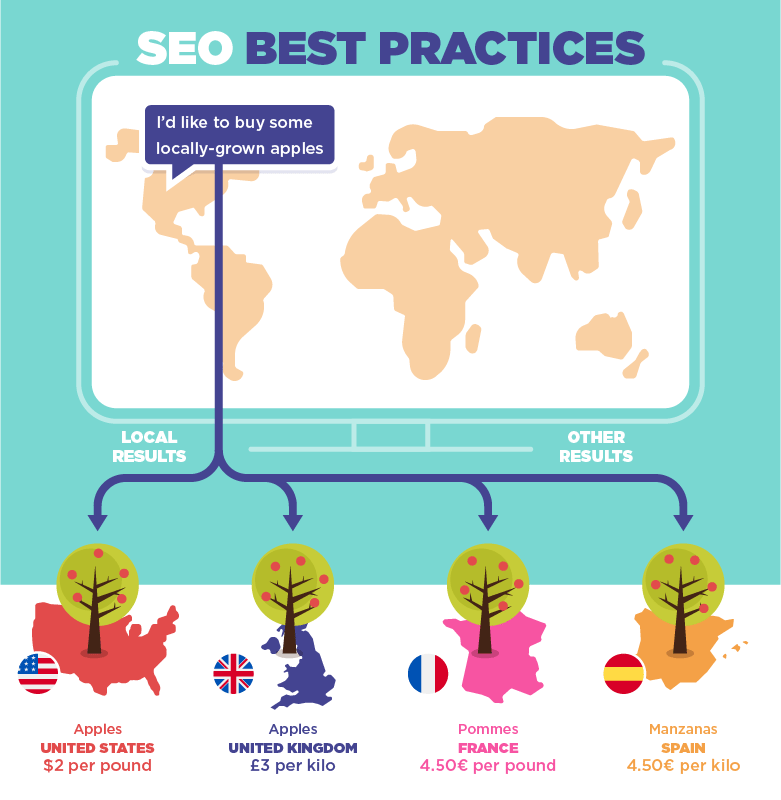Driving International Success: The Power of Strategic SEO Development
Driving International Success: The Power of Strategic SEO Development
Blog Article
Navigating the Digital Landscape: Leveraging International Search Engine Optimization for Cross-Border Success
In today's interconnected digital world, companies are progressively looking beyond boundaries to touch right into global markets. The complexity of browsing the digital landscape on a worldwide scale requires a nuanced approach, from understanding the basics of International SEO to implementing geotargeting and multilingual key phrase methods.
Comprehending International SEO Principles
Navigating the ins and outs of global SEO needs a solid understanding of essential concepts to efficiently broaden on the internet exposure across borders. One vital facet of global search engine optimization is comprehending the significance of localization. This entails customizing internet site material to match the etymological, social, and industrial differences of target audience. Key words must be not just translated yet additionally adapted to mirror exactly how individuals in different areas search for info.
Additionally, having a clear understanding of geo-targeting is crucial. This involves indicating to browse engines the particular countries or areas a web site is targeting. Executing hreflang tags is one means to communicate this info, ensuring that the right version of a website shows up in the search results for an individual in a certain area.
Furthermore, comprehending the influence of neighborhood online search engine and social media platforms is important for worldwide search engine optimization success. As an example, while Google is leading in lots of areas, nations like China have their very own search engines like Baidu, needing tailored methods for each and every system to make best use of on-line presence.

Targeting Multilingual Key Words Strategies
Establishing multilingual key phrase strategies is necessary for efficiently getting to diverse global target markets and making best use of on the internet presence across various etymological regions. When targeting multilingual key words approaches, it is critical to carry out complete research to recognize the specific search terms and phrases made use of by the target audience in each linguistic area. This entails not just converting key words however additionally thinking about cultural nuances, regional dialects, and search fads unique to every target market.
To develop an effective multilingual keyword phrase technique, it is very important to prioritize significance and search intent. Search phrases must straighten with the content on the web site and resonate with the social context of the target audience. Using tools such as Google Search Phrase Planner, SEMrush, or Ahrefs can assist determine high-performing key phrases in various languages and analyze their search volume and competition level.
Furthermore, tracking and assessing the efficiency of multilingual search phrases frequently is essential for maximizing and improving the strategy in time. By continuously adapting to adjustments in search habits and trends, organizations can improve their on-line exposure and draw in more international traffic to their web sites.
Implementing Geotargeting and Hreflang Tags
When intending to improve global SEO techniques, incorporating geotargeting and hreflang tags is vital for optimizing web site visibility throughout different areas. Geotargeting includes tailoring web content to particular locations, ensuring that individuals in different areas obtain appropriate information. By applying geotargeting, companies can enhance their neighborhood search rankings and bring in region-specific traffic.

Optimizing Site Structure for Worldwide Visibility
To additionally enhance worldwide search engine optimization techniques past navigate to this website geotargeting and hreflang tags, optimizing the site framework is critical for achieving worldwide exposure and making best use of reach throughout various regions. A well-structured site not only boosts customer experience yet additionally promotes online search engine crawlers in recognizing the material and context of the site. When aiming for global presence, it is important to guarantee that the website is arranged in a sensible way that accommodates customers from numerous countries. Implementing a clear pecking order with distinctive categories and subcategories can help in improving the website's navigating and user-friendliness.
Additionally, creating language-specific subdirectories or subdomains can assist internet search engine deliver the best variation of the site to customers based upon their language choices, further boosting the overall user experience. Furthermore, optimizing URL structures to include appropriate keywords and geotargeted terms can enhance the website's exposure in various regions. By structuring the site efficiently for international target markets, businesses can More hints increase their chances of bring in international traffic and broadening their reach across borders.

Monitoring and Analyzing Cross-Border Efficiency
Efficient monitoring and studying of cross-border performance is crucial for assessing the success of international search engine optimization strategies and recognizing opportunities for improvement in global reach and visibility. By very closely tracking vital performance indications (KPIs) across various markets, businesses can get useful insights into the performance of their cross-border SEO efforts. Keeping track of metrics such as natural traffic, keyword positions, conversion prices, and bounce prices can offer a thorough view of exactly how well an internet site is executing in various regions.
Assessing cross-border performance data permits organizations to identify patterns, patterns, and locations for optimization. By comparing efficiency across different countries, regions, or languages, companies can pinpoint successful methods and center web content to better accommodate certain target market. Furthermore, monitoring cross-border performance enables companies to remain agile and receptive in the ever-evolving electronic landscape. Routine analysis of search engine optimization performance on an international range guarantees that business can adapt their approaches promptly to maximize emerging possibilities and maintain an one-upmanship in international markets.
Conclusion
Finally, international search engine optimization plays an essential role in attaining cross-border success by optimizing internet sites for worldwide visibility, targeting multilingual keyword phrase techniques, carrying out geotargeting and hreflang tags, and monitoring cross-border performance. By recognizing the principles of international search engine optimization and maximizing site frameworks as necessary, companies can successfully get to and involve with their target market across different areas and languages. This calculated technique is vital for expanding market reach and driving on the internet growth in their explanation today's electronic landscape.
Report this page